Key takeaways:
- Online writing courses provide flexibility, diverse materials, and community engagement, enhancing the learning experience for writers.
- Key skills developed include self-discipline, adaptability in writing style, and improved self-editing abilities.
- Feedback from peers and instructors is crucial for identifying blind spots and fostering growth, turning initial fears into enthusiasm.
- Establishing a consistent writing routine, tracking progress, and applying learned techniques to real projects lead to significant creative growth.
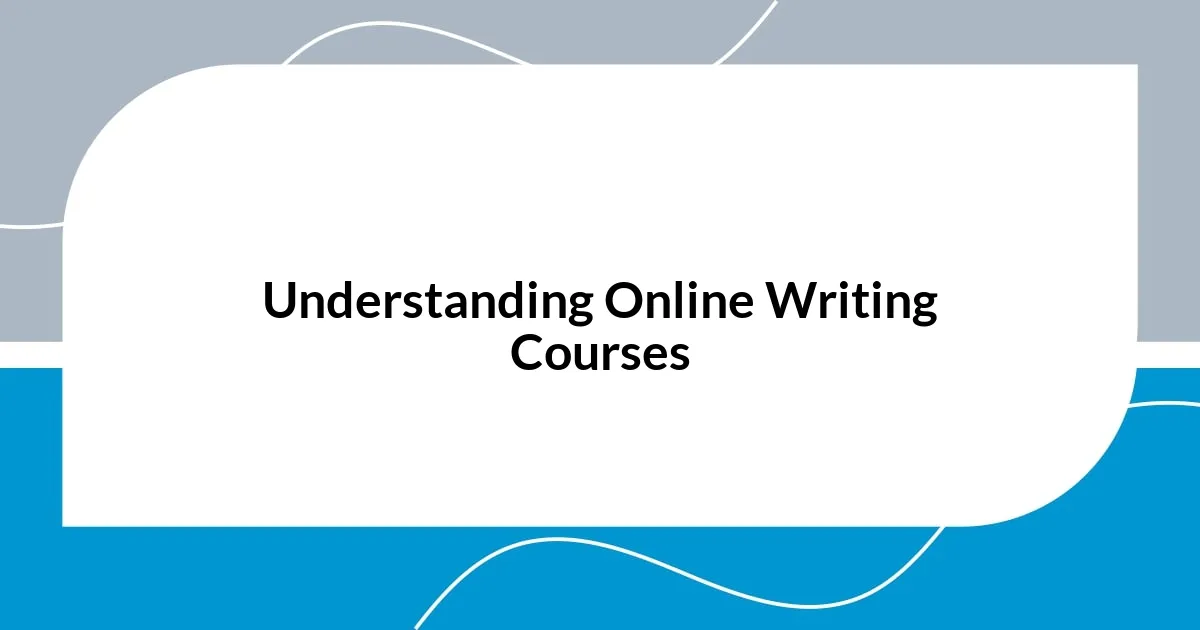
Understanding Online Writing Courses
Online writing courses have become a lifeline for aspiring writers, offering flexibility and a wealth of resources at our fingertips. I remember signing up for my first course on a whim, eager to find a structure to my chaotic writing habits. The moment I accessed the diverse materials, from video lectures to engaging forums, it felt like opening a treasure chest of knowledge.
What amazed me most was the variety of voices and styles one could encounter in these courses. Each instructor brought their unique flair, making the experience feel incredibly personal. Have you ever wondered how different perspectives can shape your own writing? For me, immersing myself in various approaches not only sparked inspiration but also challenged my habits in ways I hadn’t anticipated.
Another striking aspect is the sense of community that blossoms within these platforms. I vividly recall sharing my work and receiving constructive feedback that pushed me to refine my craft. That camaraderie was unexpected, but it served as a reminder that even in the digital space, we can form connections that fuel our creative spirits. Isn’t it uplifting to think that support can come from strangers who are just as passionate about writing?
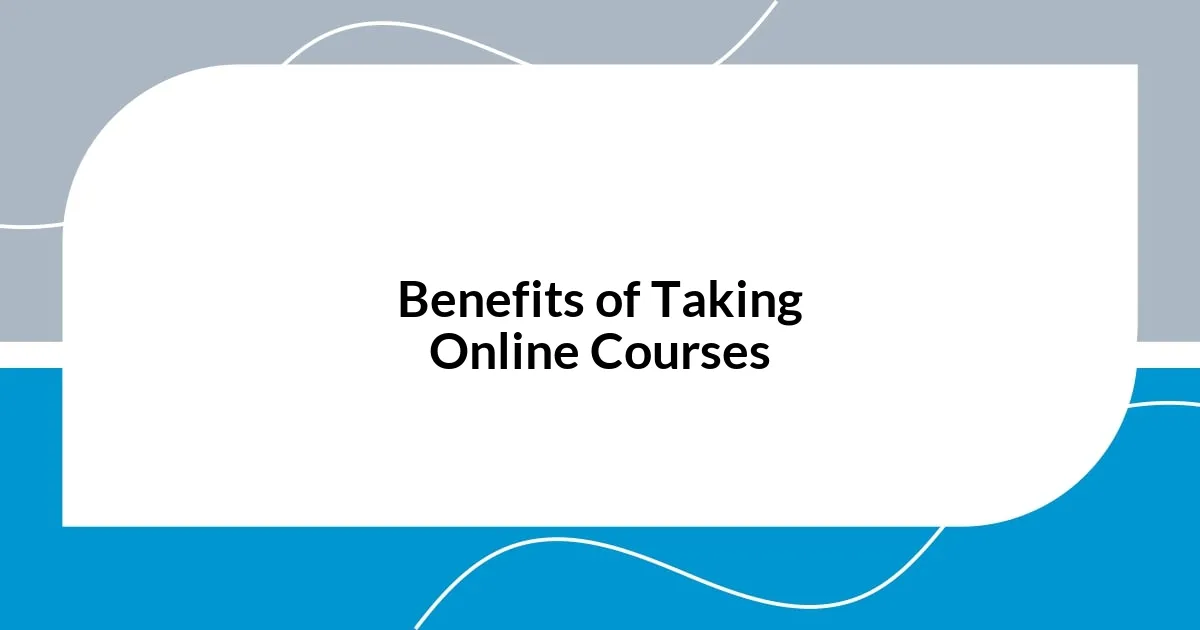
Benefits of Taking Online Courses
Taking online courses is a game-changer for many writers seeking growth. One benefit that struck me was the ability to learn at my own pace. When I first enrolled in an online writing class, life was hectic, and juggling various commitments felt daunting. Having the option to revisit lectures and take my time with assignments allowed me to fully grasp the concepts without feeling rushed.
Here are some key benefits I discovered:
– Flexibility: You can study whenever and wherever suits you best, which is a huge advantage for busy individuals.
– Diverse Learning Materials: Access to various resources, like videos, articles, and forums, caters to different learning styles.
– Expert Guidance: Many courses are taught by published authors or industry professionals who offer invaluable insights.
– Community Engagement: Online platforms often foster a sense of connection with fellow learners, providing support and motivation.
– Cost-Effective Learning: Compared to traditional courses, online options can be more affordable and accessible.
Another significant advantage is the depth of individualized feedback one receives. I remember how nerve-wracking it was to share my first piece in a workshop setting, but the thoughtful critiques I received illuminated aspects of my writing I hadn’t considered. This ongoing cycle of sharing and receiving feedback not only bolstered my confidence but also refined my skills in ways I hadn’t expected. The experience made me realize that this unique interaction can often lead to breakthroughs in one’s personal writing journey.
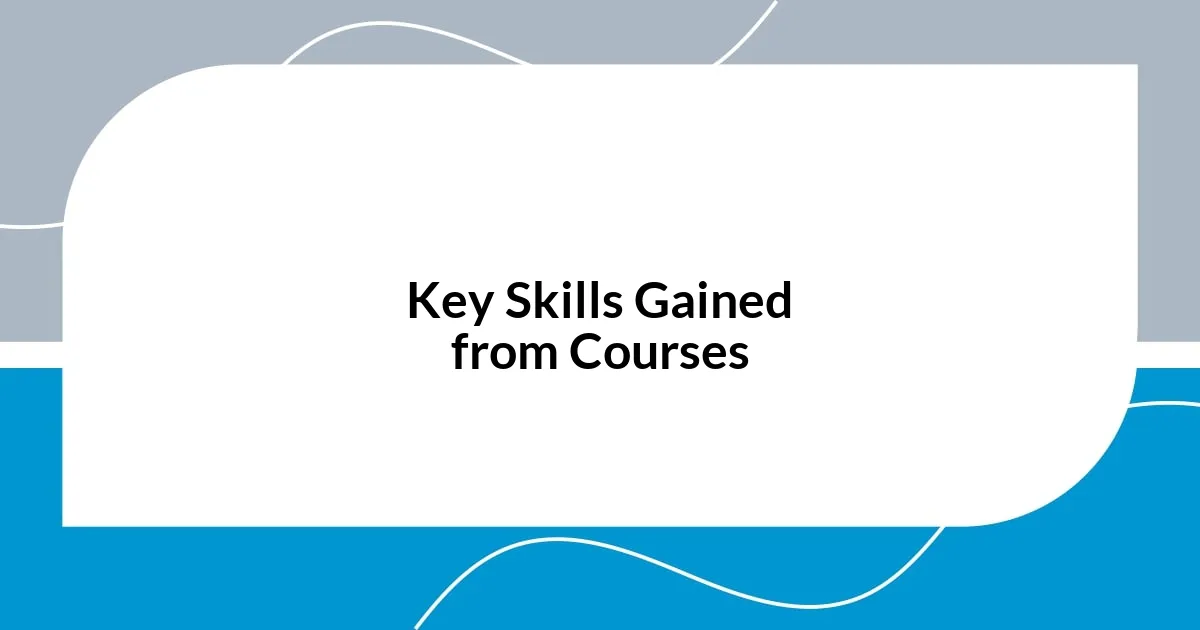
Key Skills Gained from Courses
Online writing courses have an incredible ability to equip writers with essential skills that drive their growth. One standout skill I gained was the art of self-discipline. I recall struggling with procrastination, often leaving assignments until the last minute. However, the structured format of deadlines and my commitment to peers pushed me to establish a routine, which transformed not only my writing practice but also my daily habits.
Another crucial aspect I developed was the ability to adapt my voice. Initially, I didn’t realize how rigid I was in my writing style. Engaging with various instructors and their feedback helped me experiment with different tones and styles. I remember writing a piece emulating a more poetic style, which felt uncomfortable at first, but it widened my perspective on expression. It was a vivid reminder of how stepping outside my comfort zone opens doors to authentic creativity.
Lastly, the skills of criticism and self-editing surfaced beautifully through these courses. I learned how to approach my own drafts with a critical eye, much like I would others’ work. This shift was insightful; I embraced the process of refining my writing, understanding that first drafts are merely stepping stones. Each line I revised felt like a celebration of growth, setting me on a path where continual improvement became the norm.
| Skill | Description |
|---|---|
| Self-Discipline | Learning to manage time and meet deadlines, leading to better writing habits. |
| Adaptability | Experimenting with different styles and tones for a more authentic voice. |
| Critical Eye | Improving self-editing skills and understanding the importance of revisions. |
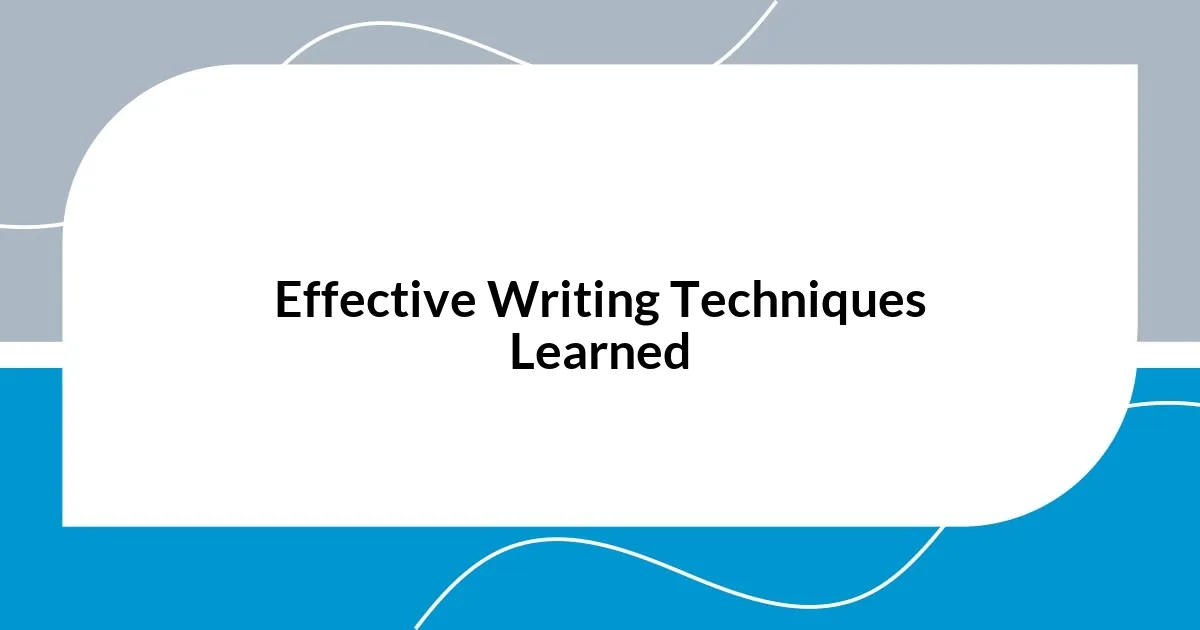
Effective Writing Techniques Learned
One of the most impactful techniques I picked up from online writing courses is the power of showing rather than telling. Early in my writing journey, I often fell into the trap of simply stating facts. I remember a workshop where a mentor challenged me to paint a scene through sensory details. That experience flickered a lightbulb in my mind; suddenly, my writing transformed. Now I strive to evoke emotions and imagery, allowing readers to experience the story rather than just read about it. Isn’t it fascinating how that shift can breathe life into words?
Another technique that resonated deeply with me is the importance of structure. Initially, my drafts resembled a jigsaw puzzle with missing pieces. Learning about outlining changed everything. During one exercise, I crafted an outline for a short story, and it felt like I was laying a solid foundation before building the house. This structured approach not only saves time in the revision phase but also clarifies my thoughts, making the writing flow more naturally. Have you ever felt overwhelmed by the chaos in your drafts? Trust me, organized writing can reduce that stress immensely.
Finally, I discovered the art of active voice versus passive voice. In one of my early feedback sessions, a fellow writer pointed out how my sentences felt lifeless at times. As I started to embrace the active voice, my writing gained energy and urgency. The difference was like switching from a quiet whisper to a confident shout. Now, when I reread my work, I can feel the rhythm and vitality pulse through it. How empowering it is to know that our word choices can significantly impact how our stories resonate with others!
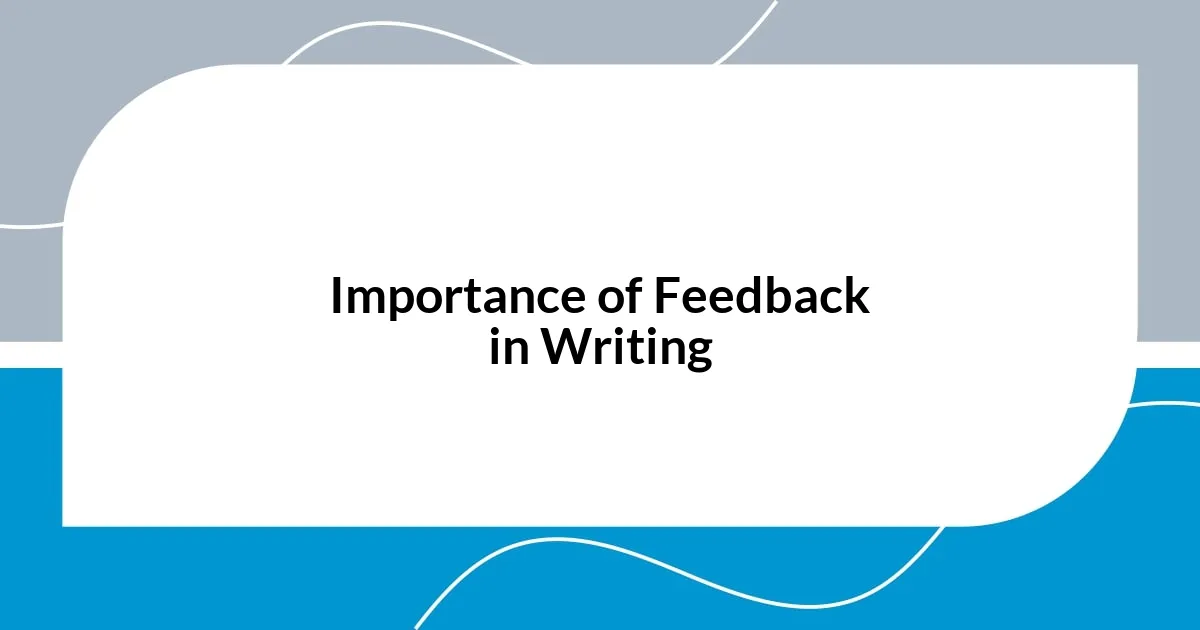
Importance of Feedback in Writing
Receiving feedback on my writing has been a game-changer for me. I remember the first time I shared a piece during a workshop; my heart raced as feedback rolled in. Surprisingly, what felt like criticism soon became my strongest learning tool. Each suggestion opened my eyes to nuances I hadn’t considered, and I found joy in refining my work. Isn’t it interesting how the right feedback can transform fear into enthusiasm?
I’ve come to appreciate how feedback illuminates blind spots in our writing. After one particularly constructive session, my instructor pointed out repetitive phrases that I simply couldn’t see. It was a light bulb moment! That realization made me think: how often do we miss crucial elements because we’re too close to our work? Now, I actively seek feedback, understanding that it’s less about personal deficiency and more about growth.
What I’ve learned is that feedback is not just about fixing flaws; it’s about building a community of support. During one assignment, my peers rallied to provide insights on my character development, and their encouragement empowered me to take risks in my writing. It’s heartwarming to discover that collective wisdom often leads to innovative breakthroughs. Wouldn’t you agree that sharing our journeys can lead not only to improved writing but also to strong relationships with fellow writers?
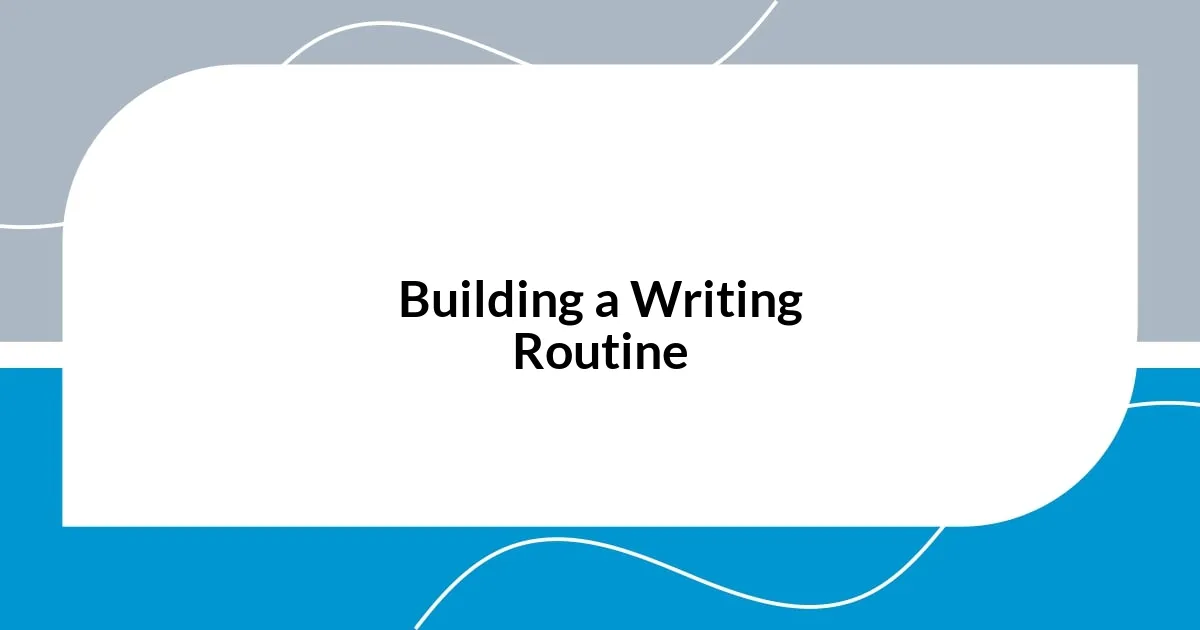
Building a Writing Routine
Building a consistent writing routine can feel like a daunting task at first, but I found that setting specific writing times helped shape my day and keep me accountable. I chose mornings, armed with coffee and a notebook, embracing those quiet hours when my mind felt fresh. Have you ever experienced that rush of creativity before the world wakes up? It’s magical.
I remember a period of struggle when my writing sessions became sporadic. A mentor advised me to treat writing like an appointment—non-negotiable. I began to see the benefits almost immediately. Keeping a calendar or using apps to remind me became vital. I’m now able to carve out dedicated blocks of time, which allows ideas to flourish without interruption. Isn’t it amazing how discipline can cultivate creativity?
For me, the real breakthrough came when I started tracking my progress. I kept a journal where I noted my word count and explored my thoughts about each session. This practice not only motivated me but also highlighted moments of growth that I might have overlooked. If you’ve ever doubted your progress, try documenting your journey. You’ll be astonished at how far you’ve come and how a simple routine can lead to significant results.

Applying Lessons to Real Projects
Applying what I’ve learned from online writing courses to real projects has been both exciting and rewarding. I remember the first time I tackled a short story structured around the classic narrative arc. I had always been hesitant about plot development, but after learning about rising action and climax, I found myself eager to outline my story. The process felt like unwrapping a gift; each section revealed surprises I hadn’t anticipated. Have you ever felt that thrill when ideas start to connect?
During a recent poetry project, I decided to implement the techniques for imagery that I’d picked up in a workshop. I was initially skeptical—I thought my poems were complete. Yet, as I revisited them with fresh eyes, I focused on crafting vibrant visuals. Suddenly, a line about a “flickering candle against a darkened room” sparked feelings I hadn’t conveyed before. I’ll never forget the sense of achievement when those subtle changes made my work not just readable but resonant. Isn’t it astonishing how a few tweaks can breathe life into your words?
Integrating feedback and new techniques into real projects has also taught me to embrace risk-taking. In one group assignment, I experimented with a non-linear narrative, something I had once viewed as beyond my reach. Initially, I felt anxious—the fear of how it would be received gnawed at me. But pushing through that fear led to discussions that enriched my story, showing me that vulnerability in writing often leads to unexpected connections. Have you ever taken a leap in your writing? The rewards are often greater than the fears holding us back.